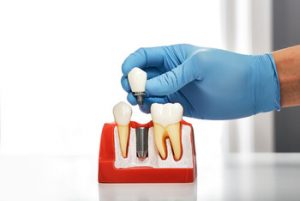In pursuit of a perfect smile and improved oral health, many individuals explore the option of dental implants. Dental implants are considered a remarkable solution for replacing missing or damaged teeth, offering a long-lasting, natural-looking replacement. However, one pressing question often arises: Is a cheap dental implant worth the risk?
The allure of affordable dental implants can be compelling, but it’s essential to delve into the depths of this decision. In this extensive guide, we will delve into the realm of affordable dental implants and identify any possible hazards. From the dangers of seeking dental implants overseas to red flags to watch out for when selecting your dentist, we will provide you with the knowledge to make an informed choice.
As we embark on this journey, we will investigate methods of cutting dental implant costs without compromising quality. You’ll gain a thorough understanding of the procedure involved in receiving premium dental implants, as well as tips on how to choose a dentist that prioritises quality. Plus, we’ll shed light on the additional procedures that only top-tier dentists consider.
Join us in exploring affordable dental implants, their risks, and how to navigate this critical decision while preserving your smile and oral health. Let’s get started on your path to understanding the world of cheap dental implants.
Are Cheap Dental Implants Worth The Risk?
When it comes to dental implants, affordability is important, but it should never be the main deciding factor. Here, we’ll discuss some possible issues as well as whether or not getting inexpensive dental implants is worth the gamble.
The Temptation Of Cheap Dental Implants
Affordable dental implant options may seem like a shortcut to replacing missing teeth with a beautiful smile without breaking the bank. However, it’s crucial to assess the true value of these budget-friendly alternatives.
Risks Of Cheap Tooth Implants
 Cheap dental implants may come with several risks, including:
Cheap dental implants may come with several risks, including:
- Lower Quality Materials: Cutting costs often means using inferior materials that may not withstand the test of time.
- Inexperienced Dentists: Some budget providers may lack the necessary expertise and experience, increasing the likelihood of complications.
- Lack Of Comprehensive Care: Comprehensive care, including pre-operative evaluation and post-operative support, is crucial for successful implant procedures and may be compromised with low-cost options.
The Importance Of Long-Term Value
Your entire health and oral health are investments that you make with dental implants. Focusing solely on upfront savings may lead to costly complications down the road.
Risks Of Getting Dental Implants Overseas
For some individuals seeking cheap dental implants, the allure of dental tourism is strong. However, there are significant risks associated with getting dental implants overseas that should not be underestimated.
Quality Control Concerns
Dental standards and regulations can vary widely from one country to another. When seeking dental care abroad, it may be challenging to verify the qualifications and credentials of dental professionals and the quality of the materials used.
Communication Challenges
Language barriers can hinder effective communication between patients and dental practitioners. This can lead to misunderstandings about treatment plans, expectations, and post-operative care.
Limited Post-Operative Support
Dental implant procedures require ongoing post-operative care and follow-up appointments. When receiving treatment overseas, it may be challenging to access the necessary follow-up care, potentially leading to complications.
Legal Recourse
If there are issues or unsatisfactory results, it can be costly and challenging to take legal action in a foreign country.
Travel Risks
Because of jet lag, stress from travel, and exposure to new settings, there is an increased risk of difficulties while travelling right before or after dental implant surgery.
While dental tourism may offer cost savings, it’s essential to weigh these potential risks carefully. Prioritising your oral health and ensuring the highest quality of care should remain the top considerations in your decision-making process.
Red Flags When Looking For Your Dentist
It’s important to select the correct dentist for your dental implant surgery. Here, we’ll discuss the red flags you should be cautious of when searching for a dentist to ensure you receive high-quality care.
Inadequate Qualifications
Check for proper qualifications, licences, and certifications. Be cautious of dentists who lack the necessary training and credentials to perform dental implant surgery.
Lack Of Experience
Experience matters in dental implant surgery. Seek out a dentist who has successfully completed several treatments and has implanted a sizeable number of implants.
Poor Online Reputation
Research the dentist’s online reviews and testimonials. Consistently negative reviews or a lack of online presence can be warning signs.
No Clear Treatment Plan
A reputable dentist will provide you with a clear treatment plan, including a breakdown of costs, the number of visits required, and the expected timeline.
Pushy Sales Tactics
Beware of dentists who pressure you into immediate decisions or promote overly aggressive sales tactics. Your dental implant decision should be well-informed and not rushed.
Lack Of Transparency
 Transparency in discussing risks, potential complications, and the expected outcome is vital. A trustworthy dentist will ensure you have realistic expectations.
Transparency in discussing risks, potential complications, and the expected outcome is vital. A trustworthy dentist will ensure you have realistic expectations.
Inadequate Facilities
The dental clinic should meet appropriate standards for cleanliness and equipment. A subpar clinic may compromise your safety and the quality of care.
No References Or Referrals
A reputable dentist should be willing to provide references or referrals to past patients who can share their experiences.
Identifying these red flags can help you steer clear of potential dental implant pitfalls and ensure you choose a dentist who prioritises your oral health and well-being.
How To Save Money On Your Dental Implant Cost
While quality should never be compromised, there are strategies to help you save money on your dental implant costs without sacrificing the standard of care. Here are some practical tips:
Insurance Coverage
Check if your dental insurance provides any coverage for dental implants. While coverage may be limited, it can still help reduce your out-of-pocket expenses.
Government Programmes
Enquire about government programmes or subsidies that may assist with dental implant costs, especially if the procedure is deemed medically necessary.
Payment Plans
Many dental clinics offer flexible payment plans that give you the chance to spread the cost of dental implants over time, making them more manageable.
Comparative Quotes
Seek quotes from multiple dental clinics to compare costs and services. However, remember that the cheapest option isn’t always the best.
Tax Deductions
In some cases, dental implant expenses may be tax-deductible. Consult with a tax professional to explore this possibility.
Health Savings Accounts (HSAs) Or Flexible Spending Accounts (FSAs)
If you have these accounts, you may use them to pay for dental implant procedures, offering potential tax advantages.
Selection Of Dental Implant Type
When you’re seeking dental implant procedures, make sure you know the number of dental implant crowns and fixtures that you need. Full-mouth dental implants cost less than single dental implants for those who lost almost all their teeth within their upper or lower arch.
Financing Companies
Investigate dental financing companies that are experienced in medical procedures, including dental implants. They can provide loans with manageable interest rates.
Timing
Discuss with your dentist the option of scheduling your procedure during special promotions or discounts, if available.
Remember that while cost-saving measures are essential, they should never compromise the quality of care or the expertise of your dental professional. Always prioritise your oral health and long-term well-being.
Choosing The Right Dentist Without Sacrificing Quality On Your Dental Implant Treatment
Selecting the ideal dentist for your dental implant procedure is paramount to its success. Here’s a step-by-step guide on how to choose the right dentist without compromising on quality:
Check Qualifications And Credentials
Verify that the dentist is appropriately qualified, licenced, and certified to perform dental implant surgery. Look for memberships in professional organisations related to implant dentistry.
Assess Experience
Consider the dentist’s experience in dental implant procedures. An experienced practitioner is more likely to deliver successful outcomes with fewer complications.
Review Patient Testimonials
Read patient testimonials and online reviews to gain insights into the experiences of previous patients. Positive reviews and satisfied patients are indicators of a reputable practitioner.
Consultation Process
A thorough initial consultation is crucial. During this consultation, the dentist should assess your unique dental condition, discuss treatment options, and provide a clear treatment plan, including costs and timelines.
Implant Brands
Enquire about the implant brands the dentist uses and their reasons for recommending a particular brand. High-quality implant brands with a proven track record are crucial for long-term success.
Treatment Approach
Understand the treatment approach the dentist follows, including pre-operative assessments, surgical techniques, and post-operative care. A comprehensive approach is essential for a successful outcome.
Cost Transparency
Ensure that the dentist provides transparent and detailed cost estimates for the entire procedure, including any potential additional costs. It’s crucial to have a clear understanding of the financial aspect of the treatment.
Communication And Comfort
Effective communication and a comfortable patient-dentist relationship are vital. You should feel at ease discussing your concerns and questions with the dental professional.
Location And Accessibility
Think about the dental clinic’s accessibility and location. Proximity to your home or workplace can simplify follow-up visits and emergencies.
Emergency Care
Enquire about the dentist’s availability for emergency situations or unexpected complications that may arise during or after the procedure.
By following these steps, you can select a dentist who aligns with your unique needs and goals, ensuring a smooth and successful dental implant journey.
A Step-By-Step Overview Of A High-Quality Dental Implants Procedure
Understanding the steps involved in a high-quality dental implants surgery can help you make an informed decision. Here’s a comprehensive overview of what to expect during this dental treatment:
- Initial Consultation: The process begins with a thorough initial consultation with your chosen dentist. The dentist will scrutinise your teeth, take X-rays, and go over your treatment choices with you at this appointment.
- Treatment Planning: Your dentist will develop a customised treatment plan based on the evaluation and your unique requirements. This plan will specify how many and what sort of implants will be needed, along with the overall surgery timeframe.
- Preparatory Procedures: To make sure there is enough bone structure to support the implants, it may occasionally be required to do preparatory surgeries such as sinus lifts or bone grafting.
- Implant Placement: Dental implant placement is a surgical procedure where the implants are precisely positioned in your jaw bone. This step typically requires local anaesthesia or sedation to ensure your comfort.
- Healing And Osseointegration: After implant placement, a healing period of several months is necessary. During this time, the implants will naturally fuse with the surrounding bone in a process called osseointegration.
- Abutment Placement: Once osseointegration is complete, abutments are attached to the implants. These abutments serve as connectors between the implants and the artificial teeth.
- Impressions: Your dentist will take impressions of your mouth to create custom-made dental crowns or prostheses that will fit perfectly with your existing teeth.
- Final Prosthesis: The final step involves attaching the dental crowns or prostheses to the abutments. This step completes your smile restoration, providing natural-looking and functional teeth.
- Post-Operative Care: Comprehensive post-operative care, including regular check-ups and maintenance, is essential to ensure the long-term success of your dental implants.
You will be more secure about getting your dental implant treatment when you are educated about every step of the way.
Additional Procedures Considered By Top-Tier Dentists
Top-tier dentists prioritise not only the primary dental implant procedure but also additional procedures that enhance the overall outcome and patient satisfaction. Here are some procedures that these experienced practitioners often consider:
- Comprehensive Oral Examination: Before proceeding with dental implants, a thorough oral examination is conducted to identify any underlying issues that could affect the success of the procedure. This includes evaluating the condition of adjacent teeth and overall oral health.
- Bone Augmentation: In cases where the jaw bone lacks sufficient density or volume to support implants, bone augmentation procedures may be recommended. These procedures involve grafting bone to strengthen the implant site.
 Soft Tissue Grafting: To improve the appearance and stability of dental implants, top-tier dentists may perform soft tissue grafting to enhance the gum line and create a more natural aesthetic.
Soft Tissue Grafting: To improve the appearance and stability of dental implants, top-tier dentists may perform soft tissue grafting to enhance the gum line and create a more natural aesthetic.- Custom Prosthetics: Custom-made dental crowns or prostheses are crafted to ensure a perfect fit, a natural appearance, and optimal functionality. These prostheses are custom-made to satisfy every patient’s needs.
- Advanced Surgical Techniques: Experienced dentists may employ advanced surgical techniques, such as guided implant surgery using 3D imaging, to enhance precision and minimise complications.
- Lifelong Maintenance: Top-tier dentists emphasise the importance of lifelong maintenance for dental implants. Regular check-ups, professional cleanings, and diligent oral hygiene are essential for long-term implant success.
- Patient Education: These dentists prioritise patient education, ensuring that individuals fully understand the maintenance and care required for their dental implants to remain in excellent condition.
By considering these additional procedures and focusing on comprehensive care, top-tier dentists aim to provide their patients with the best possible outcomes and a lasting, confident smile.
Frequently Asked Questions
How long does a typical dental implant procedure take, from start to finish?
The duration of a dental implant procedure can vary depending on individual cases. It typically involves several months, including the initial consultation, implant placement, healing and osseointegration, abutment placement, and the final prosthesis attachment.
Is dental implant surgery painful?
Dental implant surgery is typically performed under local anaesthesia or sedation, ensuring minimal discomfort during the procedure. Post-operative discomfort can be managed with prescribed pain medications and usually subsides within a few days.
How do I maintain my dental implants for the long term?
A8: Maintaining dental implants involves diligent oral hygiene, including brushing, flossing, and regular dental check-ups. Your dentist will provide specific care instructions, and lifelong maintenance is crucial for the success of your dental implants.
Making Informed Decisions About Your Dental Implants’ Cost
Your dental health is a valuable investment. While cost considerations are essential, never compromise on quality when it comes to dental implants. By making informed decisions, choosing the right dentist, and prioritising comprehensive care, you can embark on a dental implant journey that enhances not only your smile but also your overall well-being.
Ready to get high-quality dental implants that look exactly like your natural teeth? Drop Beyond Infinity Dental a call at (02) 8806 3799, and our team will make sure your artificial tooth is worth the while!
Note: Any surgical or invasive procedure carries risks. Before proceeding, you should seek a second opinion from an appropriately qualified health practitioner.
Sources:
Bone Grafts | Options and Cost | Bupa Dental Care. www.bupa.co.uk/dental/dental-care/treatments/dental-implants/supporting-treatments/bone-grafts.
Can I Use My HSA or FSA to Pay for Dental Services? blog.healthequity.com/hsa-and-fsa-for-dental-care.
Colgate. “Dental Tourism: 5 Risks of Traveling for a Dental Procedure.” Colgate, 10 Mar. 2022, www.colgate.com/en-us/oral-health/dental-visits/dental-tourism-5-risks-of-traveling-for-a-dental-procedure.
Howley, Elaine K., and Patric Cohen. “How to Find a Good Dentist.” US News & World Report, 20 Apr. 2022, health.usnews.com/health-care/patient-advice/articles/how-to-find-a-good-dentist.
Lamb, Sandra. “When Dental Implants Go Wrong.” AARP, 4 Oct. 2023, www.aarp.org/health/conditions-treatments/info-2020/dental-implants-danger.html.
Ryu, Jenna. “The Biggest Red Flags to Watch Out for at the Dentist.” SELF, 19 Sept. 2023, www.self.com/story/dentist-red-flags.
Steinheimer, Lauren. “5 Ways to Get Low-Cost Dental Implants.” NewMouth, 30 Oct. 2023, www.newmouth.com/blog/low-cost-dental-implants.
Whelan, Corey. “Everything to Know About a Dental Implant Procedure.” Healthline, 3 May 2021, www.healthline.com/health/dental-and-oral-health/dental-implant-procedure.









